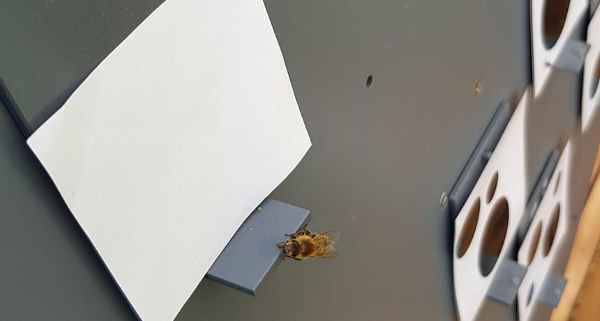A new study has shown for the first time that even some insects are capable of mathematical abstraction: bees, for example, would recognize zero.
He is about to end up run over, his mother saves himMathematical bees? Less than a million neurons compared to the 86 billion of the human brain and yet the same ability that we humans have to recognize zero: these industrious insects would in fact be able to represent and interpret the concept of zero, thus approaching the same notion. of "nothing" to Artificial Intelligence systems.
This is the discovery that comes from the study "Bees extrapolate ordered relations to place numerosity zero on a numerical continuum", published in Science by a team of Australian and French researchers who have shown for the first time that even some insects are capable of mathematical abstraction.
Not only, therefore, essential pollinators, bees also prove to be an exceptional model in the study of the cognitive abilities of insects and to have refined numerical skills. Their little brains proved capable of using zero, that abstract and at the same time ingenious concept that allows them to represent the absence of objects by inventing a number for “nothing” considering it at the same time as a quantity.
“We have always believed that only humans have the intelligence needed to arrive at this concept, but recent research has shown that monkeys and birds also have brains that can do it. What we didn't know - until now - is whether even insects can understand zero ", explains one of the authors of the study, Adrian Dyer, of the Bio-inspired Digital Sensing (Bids) Lab of the School of media and communication at RMIT University of Melbourne.
A systematic review
Bees know how to count to at least 5 and the authors of the study tested the mathematical abilities of the European bee (Apis mellifera) on the concept of "greater than" and "smaller than".
Initially, they instructed bees to drink sugar water from an experimental device, associating a number with an image, following a sort of "rule" for "choosing the image where there are fewer elements". For example, bees learned to choose fewer items when the choice was 3 vs 4, or 2 items if they had to choose between 2 and 3. Once the bees understood how the "game" works, the team of researchers he proposed them a blank image and an image with several dots. By choosing the empty image as the one with fewer elements, bees have shown that they are able to understand that zero is less than 5, 4, 3, 2, or 1, despite not having seen a blank image before.

Bees, therefore, would be able to have an elaborate understanding of numbers despite a tiny brain and, according to scholars, these are results that can open the door to new understandings about how different brains could represent zero.
"If bees can learn such a seemingly advanced mathematical skill that we don't even find in some ancient human cultures, perhaps this opens the door to reconsidering the mechanism that allows animals and ourselves to understand the concept of nothing," says Dyer.
Dyer concludes by noting that “one of the problems in the development of artificial intelligence is that of allowing robots to operate in very complex environments. Crossing a street is easy for adult humans, we understand that if there are no cars approaching, no bikes or trams, then it's probably okay to be able to cross. But what is zero, how can we represent it for so many complex object classes to make decisions in complex environments? If bees can perceive zero with a brain of less than a million neurons, this suggests that there are simple and efficient ways to teach artificial intelligence new tricks. "
Read also:
- The bee dance: a wonderful way to communicate
- The 10 smartest animals in the world
- How bees could diagnose tumors in time
Germana Carillo


























